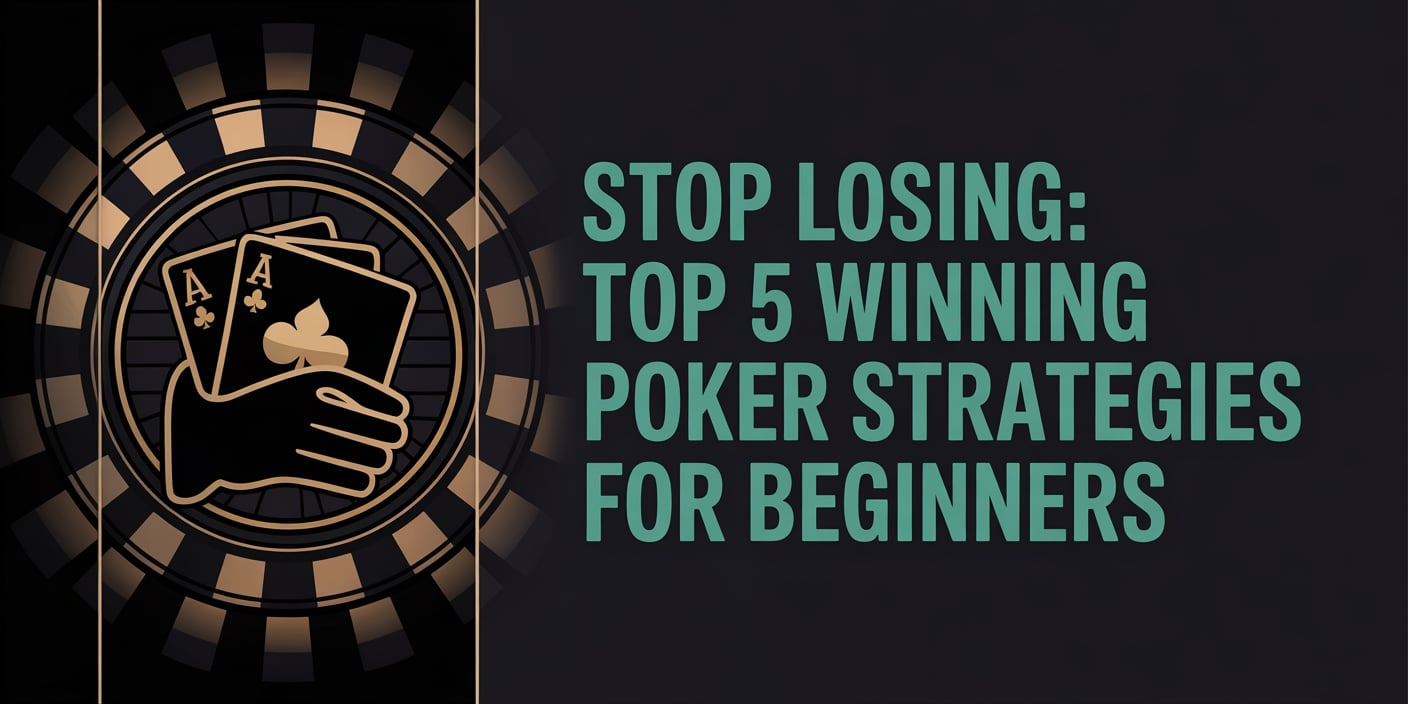Stop Losing: Top 5 Winning Poker Strategies for Beginners

Want to learn how to play poker but don’t know where to start? Here are five top strategies for beginners that will help you grasp the basics of the game right away. Whether you're just starting or already exploring real money poker sites, these tips will guide your early progress.
Traditionally, poker education starts with learning about winning hand combinations.But an even more important skill is the ability to quickly and accurately assess your chances of winning, manage your bets wisely, and attack opponents at the right moment.
This requires hours of gameplay and regular practice with different hand scenarios.
1. Play the Blinds Smartly
At the start of each hand, players set the tone of the game simply by placing their bets. That’s why it’s important to play your mandatory (blind) bets wisely.
With a small blind and weak cards, you can fold more often and save money.
But in the big blind, it’s usually better to at least call the initial bets and stay in the pot until the first three cards are dealt.
Ideally, you want to defend your big blind and call pre-flop bets, especially if you have decent cards.
2. Don’t Be Afraid to Fold
One of the most common beginner mistakes is playing every hand. The excitement, eagerness to learn, and desire to be involved—even with bad cards—is not always a winning strategy.
Players must remember they can always fold and avoid losing money unnecessarily.
Curiosity often pushes you to match opponents’ bets, which frequently leads to losses. So if you're unsure or holding clearly weak cards—don’t be afraid to fold.
By analyzing later gameplay and evaluating when folding was the right move, you’ll learn to improve your decision-making over time.
3. Bluff the Right Way
Another typical rookie mistake is excessive or unwise bluffing. Usually, opponents catch on to such behavior after just a few hands.
Effective bluffing is a pro-level skill, so start slow and smart.
The best time to bluff is when your hand actually supports it—for example, if you’re one card away from completing a straight or a flush (called a straight draw or flush draw). In such cases, you have decent chances of hitting your combination with the final card, so you can pressure opponents by raising the bet.
Players call this a semi-bluff—you’re not bluffing completely, because your hand has real potential.
4. Play Slowly but Aggressively
Trying to play every hand usually leads to a rapid loss of all your chips.
The best way to gain experience is to prolong the game and strike when you have strong cards.
Inexperienced players often make mistakes post-flop, so minimize your error rate by folding weak hands and only playing solid ones.
But don’t go all-in the moment you land your first good combo. Instead, try to build pressure slowly by gradually increasing your bets.
5. Avoid Tilt
This final point connects with all the others and deserves special attention.
Tilt refers to any poker decision made under emotional stress. Players can remain tilted for a long time, driven by the desire to recover losses or win back more.
Surprisingly, there’s no universal fix for tilt. Due to human psychology, no one is fully immune to gambling addiction.
At the very least, you can check in with yourself regularly and ask: Why am I playing? If your only reason is to recover earlier losses, then something’s wrong.
Five Simple Tips from Poker Pros
1. Don’t Dream of Big WinningsIn fact, try to think less about money altogether.Even seasoned players admit the golden era of online poker is long gone. These days, earning big money is tough unless you play at a professional level (with multiple monitors and special software).
Only a small percentage of players have steady income from online poker. The rest play at a loss and win only occasionally.
For starters, treat poker as a hobby—not a source of income.
2. Don’t Try to Learn All the Rules at OnceA common beginner mistake is spending lots of time and energy learning rules for every type of poker—just like new drivers cramming for a traffic exam.
But it’s pointless. There are dozens of popular poker variants online.
No need to dive into all the details before you’ve even played.
Start with No-Limit Texas Hold’em—the most popular poker variation. If you get hooked, switching to other versions will be easy later.
Hold’em rules may seem tricky at first, but experienced players advise jumping in as soon as you understand the basics. The best way to learn is by playing.
3. Choose a Good Poker Site
There are many poker sites to choose from.
Avoid suspicious platforms with empty promises. Instead, pick a major, trusted site with an active player base.
-
You’ll always find someone to play with.
-
You can choose games that fit your budget.
-
Deposits and withdrawals will be secure and efficient.
-
And you’ll be protected from scammers.
4. Play as Much as Possible
Experience and skill come only through practice. The more you play, the faster you improve.
Online poker allows you to play multiple tables at once, helping you gain maximum experience in minimal time.
Only by facing different poker scenarios will you truly learn. In short: theory helps, but only real gameplay will turn you into a solid poker player.
Also, the more you play, the more chances you have to learn from your own mistakes.
Experienced players say that—just like in chess—analyzing your mistakes is the most effective way to improve.
This can be done manually or with specialized software that reviews your hands and opponent behavior.
Serious players often set up multiple monitors: some for playing, others for analysis.
5. Let Go of the Romance and Superstitions
The biggest myth in poker is that it’s all about psychology, bluffing, or a mystical ability to "read" your opponent.
Sure, bluffing is part of the game—but Hollywood has over-romanticized it.
In reality, the most important elements in poker are math and probability.
That said, don’t worry—this isn’t rocket science. Even if math wasn’t your strong suit in school, you can do well in poker with dedication and the right mindset.
Отзывы: 0
Пока нет отзывов


